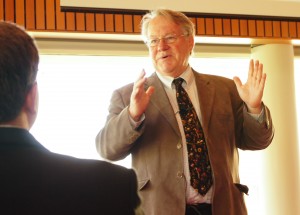James R. Fleming Ph.D. spoke on Thursday’s convocation about his 2010 book “Fixing the Sky: The Checkered History of Weather and Climate Control.” Fleming is a professor of Science, Technology and Society at Colby College. His book seeks to bring history to bear on current, pressing policy issues, and focuses on the failed attempts at managing the environment. Fleming believes a better title for this meddling called “geoengineering” is “geo-scientific-speculation.” Reporter Carl Sessions ’15 spoke with Fleming before his talk.

What is geoengineering and what might it be used for?
Geoengineering is the very speculative idea that some technological fix could respond to concerns about climate change. Geoengineering is cast right now as a heroic response using a technological fix to the very long-term, future problem of climate warming.
As for the term itself, “geo” means planetary, or very large-scale, and “engineering” is human intervention. It’s really the opposite of nanotechnology.
[Geoengineering] has occurred throughout history—the Dutch did a lot of large-scale engineering with their infrastructure on dikes, but the kind I’ll be talking about today doesn’t really exist because you can’t get a permit for it. So it’s really geo-scientific-speculation, and it’s a game that’s played with very simple computer models. It’s really not ready for prime-time and I want to make that clear. [Geoengineering] is the fantasy of people who want to be planetary surgeons—[a process that is] about as accurate as the old barber surgeons who bled their patients.
It’s really a very speculative process. Geoengineers think that they’re the lifeboat of the Titanic … I try to counter that with a little bit of questioning of what they’re really doing.
Could projects as small as dams be considered geoengineering?
I look at planetar-scale projects that affect the whole planet. My use of geoengineering includes planetary engineering or terraformation. The smaller-scale definition would include dams.
Who are these geoengineers?
It’s a very wide spectrum [and] there’s no coherent community. Geoengineers don’t have their own annual meeting. They have lobbyists, patent holders, billionaires, or enthusiasts like Rube Goldberg. And then there are people on the edges. Some of my friends are ethicists, historians or climate monitors, and these people have a more nuanced perspective.
[Some of them] are people that I truly respect, they are top-level climate modelers. [But] it quickly devolves into people who use others’ models and just plug in their own parameters. Others will just say ‘I’ve got an idea, let’s put a giant hose into the stratosphere and pump sulfur.’ It goes from relatively well-respected scientists—some of them have patents, and that’s what worries me, if something happens, they could really stand to gain a lot, they’re not wholly objective—to people like Bill Gates, who could start a field program tomorrow to burn methane in the Arctic.
Your newest book, “Fixing the Sky,” documents efforts to manipulate weather and interfere in the environment throughout human history…what is the benefit to taking a historical perspective to current environmental problems?
One of the words going around today is “unprecedented.” Almost everything seems to be unprecedented, but I like to argue that everything seems unprecedented if you don’t take a historical perspective. The fact is that the field of human control over nature has very, very deep roots—in Greek mythology, in science fiction history, and others. And it has a practice that includes both rainmaking, and the charlatans who I call “rain fakers,” who try to sell things to the public. It also has roots in large-scale manipulation of nature.
So history really matters. There have been very big snafus in the past regarding cloud seeding over Vietnam, trying to manipulate the Southeast Asian. … That was a huge scandal. There were military plans to intervene in the stratosphere. As soon as [scientists] understood ozone reactions, the military had plans to destroy it with a bromine bomb.
What are some alternatives to geoengineering?
I define what’s called a “middle path” of mitigation and adaptation in the book. The middle path is based on [the Greek myth of] Phaeton. I think we’re way off the middle path and we need to get back to an ethical engagement with the climate.
I support developing better computer models. I’m a former atmospheric scientist. The best thing to do is accelerate the middle path. People from different sides of the political spectrum can move gingerly towards adaptation and mitigation of our impact on the climate. It’s not in practice yet, but some countries are doing better than others. I was just in England, and they have an intense train system where you don’t even have to think about owning a car.
What’s the most quirky geoengineering project you’ve heard of?
I get a quirky idea coming across my blogosphere about every day. The most recent was from a practicing enthusiast of geoengineering. We have methane problems in [the] Arctic, and he thought we should set up giant torches to burn it. Imagine what the polar bears would think of us setting fire to the Arctic.
Is there anything else you’d like to add?
The history of science can really be relevant to public policy. You can bring historical wisdom to policy makers. People have a sort of hubris and think they can control different parts of nature and its proven that they are wrong. Think of the introduction of rabbits into Australia. … Ecological controls don’t work out exactly as planned. The best scientists I’ve ever met have had a sense of humility and wonder towards the universe; they’re guys who aren’t cocky and think, “I know how to do it all.”




























































